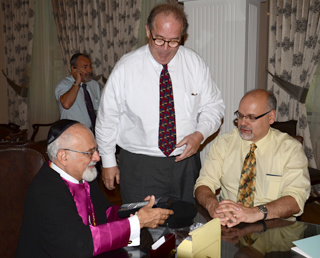A group of University of Iowa professors and local media professionals hope that their summer trip to Turkey was a cornerstone to building further relationships with educational institutions and media entities in that country.

Led by David Perlmutter, director of the UI School of Journalism and Mass Communication, the group visited Turkey June 15-24 to learn about Turkish media and culture. The trip was hosted by the Niagara Foundation, an organization that promotes global fellowship. The Niagara Foundation paid for all costs except for airfare to and from Turkey and the registration fees, which attendees paid for individually.
While in Turkey, the group visited Cappadocia, Ephesus, Istanbul, Izmir, and Kayseri, meeting with cultural leaders, media and business professionals, and university administration and faculty, and visiting historical sites.
The Turkish economy is booming and the country’s long-term economic prospects are good, according to the U.S. Department of State. The economic upswing has led to high investment in educational institutions.
“Turkey is a place that is amazing,” says Bill Casey, publisher of the Daily Iowan. “The economy is growing the second fastest in the world. They’ve built 22 new universities in the last two years.”
The University of Iowa already has some connections with Turkey. Twenty-nine Turkish students were enrolled at the university in fall 2011 (Registrar’s Office) and three UI students studied abroad in Turkey in 2010-11 (Study Abroad, most recent data available).
Because of the rapid growth, Turkish educational institutions are looking to engage U.S. partners through exchanges and other educational and research agreements, Perlmutter says.
The media business is growing as well, which according to Perlmutter, as director of a professional school of journalism, is another reason he is interested in the country.
“The media business in Turkey, including journalism, is booming. The circulation of their newspapers is shooting up,” Perlmutter says. “New news organizations, TV stations, social media news ventures are all over the place. It’s a growing market and they’re looking for top professional young people to help lead them into the future. And that’s certainly what we think we do well here.”
Though no agreements have been made yet, Perlmutter says that he hopes the journalism school can eventually develop exchanges that would provide Iowa students with opportunities to intern at Turkish newspapers or media outlets that have English language editions or news broadcasts. Additionally, Perlmutter says that many Turkish institutions are building their communications units, which could provide other opportunities for Iowa students.
“There is growth in everything over there,” he says. “Public relations is a relatively new business in Turkey that is also booming. There are so many opportunities.”
Casey says the current media explosion in Turkey is similar to what the United States was going through 100 years ago. One Turkish newspaper, Zaman, has grown from a circulation of 100,000 to one million in just ten years.
“If you want to work in the newspaper business, Turkey is the place to go,” Casey says.
In addition to Perlmutter and Casey, the Iowa delegation included Julie Andsager, professor of journalism; Kajsa Dalrymple, assistant professor of journalism; Carin M. C. Green, professor and chair of classics; Lyle Muller, executive director of Iowawatch.org; Thanos Papanicolaou, IIHR research engineer and professor of civil and environmental engineering; Vanessa Shelton, executive director of Quill and Scroll; and Tom Yunt, CEO of Woodward Communications Incorporated.
The group was accompanied by three Turkish graduate students in the UI Department of Physics and Astronomy.
Green says she was impressed with how the country is dealing with transition.
“It is a huge country and many Middle Eastern countries have long-standing connections with it,” she says. “It’s partly in Asia and partly in Europe. It symbolizes where Turkey is—partly in the East and partly in the West. Their own history of trying to negotiate this extremely difficult balancing act is part of the complexities of the 20th century.”
Perlmutter believes that it is important for American universities to cultivate relationships with other countries for the benefit of their students.
“I think it’s a generally good thing for everybody—myself, my students—to broaden our horizons by engaging in this sort of outreach,” he says. “Every student, no matter the major, is graduating into a global market. Employers are impressed when they see that someone knows another language or has significant international experience. It gives you an advantage in the job search.”